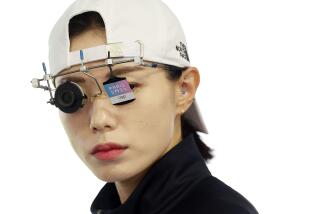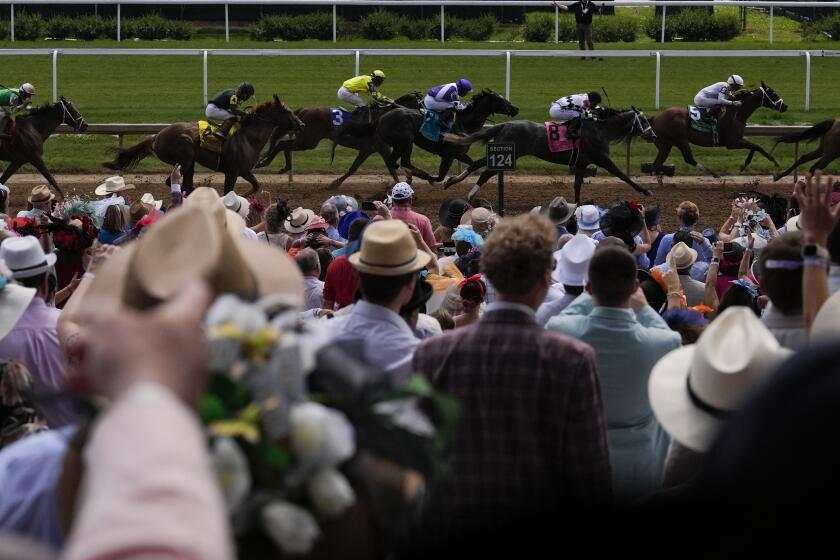Kim Taking Walk on the Wild Side
- Share via
Kevin Kim filled out the forms. He put down his accomplishments, his computer ranking, he listed his best results and signed his name. He mailed the form to the United States Tennis Assn.
Kim applied for a wild-card invitation to play in his country’s national tennis championship, the U.S. Open. But Kim, who is most comfortable speaking through his tennis racket, letting picture-perfect groundstrokes express his passion for the game, never expected to receive this precious gift, this free pass into the main draw of the most important tournament in the country.
But on Tuesday, barring rain or some other delay, Kim will step onto a court at the National Tennis Center in New York to play Fernando Meligeni, a 28-year-old Brazilian veteran, who is ranked No. 29 in the world and has twice made it to the fourth round of the French Open but who has, in seven previous U.S. Open appearances, gotten out of the first round only once.
Whatever court Kim plays on--and it will likely be far off in the corner of the monstrous grounds, perhaps one of those outer courts where people are constantly walking around, looking for better seats, craning their necks to search for better matches--Kim is going to feel pressure. He admits it. Kim, 21 years old and into his third year as a professional, feels the need to prove something.
He feels the need to prove to the USTA, which provides him with financial and coaching assistance and which gave him this wild card, that he is deserving of their help and that it was not a mistake for him to be in the main draw. Kim wants to show that he has a future, that his ranking of No. 256 is more likely to rise than to fall.
“You want to capitalize on this great opportunity,” Kim says. “You want to show you deserve what you got.”
This is Kim’s firsttrue wild card into a main draw. When he was 18, just after graduating from Sunny Hills High, Kim won the U.S. 18-under national title, and the 18-under winner always gets a wild card into the Open. So that wild card was earned, and automatic.
Wild cards are slots held open in the main draws for tournament directors to use as they wish. Direct entry into tournaments, whether Grand Slams or regular tour events, is determined mainly by computer ranking. A certain few spots are held open for qualifiers, who have to play in a tournament before the tournament. And then there are the wild cards.
Tournament directors will take phone calls for weeks from anxious agents, from desperate players, from pushy parents. Tournament directors want to use their wild cards on players who they think might draw some fans. Maybe for a local kid struggling out on the satellite tours. Maybe for a big name. For example, after Andre Agassi had let his body go and his ranking drop down into the 140s, there was not a tournament director who would not have given him a free pass to his tournament if Agassi asked.
“The process is very political,” Kim says from his hotel room in New York. “You never really understand the process, you just don’t know. I really didn’t expect one this year. The day they announce the wild cards, you call the U.S. Open and they read you the list. That’s how I found out.”
Kim spoke about how some players who are represented by the management group IMG, which also owns and runs several tournaments on the ATP circuit, will magically get wild cards into those same ATP events.
Last year William Washington, the father of three African-American players, one-time Wimbledon finalist MaliVai and Mashiska on the men’s tour and daughter Mashona, threatened a lawsuit against the USTA when none of his children received wild cards to the Open. William Washington said he thought the race of his children was held against them even though the USTA has several programs in place to attract more African-Americans to the game.
This year all three Washingtons--MaliVai, who hasn’t played this year because of a knee injury and who in fact withdrew; Mashiska, who is ranked No. 311 in the world; and Mashona, ranked No. 158--received wild cards.
“The Washingtons putting out that lawsuit,” Kim says, “I think that was a big help in getting them a wild card.”
Kim had been disappointed earlier this summer when he wasn’t offered a wild card into the ATP tour stop at UCLA. He had played a year at UCLA and, as the son of a Korean immigrant, Kim thought he might appeal to a demographic that Southern California tournament directors might be interested in. Taylor Dent, the 18-year-old from Newport Beach, is, and was, ranked lower than Kim and got a wild card.
Andrew Kim, Kevin’s father and a recreational player himself who had played high school tennis in Seoul before coming to Los Angeles as a UCLA exchange student, says that he understands how hard it might be for his son to accept the mysteries of the wild card. But then Andrew Kim also says that “I succeeded with life in the United States with barely a penny. I came here with $100 in my pocket. I’m not going to go around, and I don’t want Kevin to either, complaining about not getting a wild card. I’d rather he go through qualifying, go through the trenches, play the small tour. I tell Kevin, ‘Do it the hard way. Don’t ask for handouts.’ ”
When Kevin told his father that he wanted to quit UCLA after one year, “I wasn’t that happy,” Andrew said. “But Kevin convinced me this is what he wants to do.” Andrew, who runs a successful metals company, sold a Santa Ana office building to help finance Kevin’s career.
After winning the 18-under title and going to the U.S. Open three years ago, where, Kevin says, “I played David Wheaton on the grandstand court in a night match and got my butt kicked, [6-]4, [6-]3 and [6-]3,” tennis improvement hasn’t come as quickly as Kevin expected.
“It’s been harder. Reality on this tour is more difficult than you expect.”
Earlier this year, Kevin played in a satellite tour event in India. “The courts were terrible, the balls were pathetic and I fell down the stairs at my hotel and cut my head. I went to the hospital, got stitches and went home. That was interesting. My friend was holding a light so the doctor who stitched my head could see.”
You know what? For that experience alone Kevin Kim has earned his U.S. Open wild card.
Diane Pucin can be reached at her e-mail address: diane.pucin@latimes.com
More to Read
Go beyond the scoreboard
Get the latest on L.A.'s teams in the daily Sports Report newsletter.
You may occasionally receive promotional content from the Los Angeles Times.










